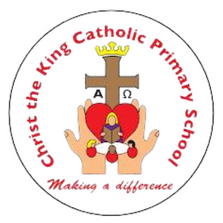Telephone +44 (0)1454 866680
HISTORY
Our Mission Statement
'Making a difference by inspiring a love of life and learning for all. We build strong foundations within God's loving hands'.
Our Core Values
We provide a Catholic Christian education based on the life and teaching of Jesus Christ. Our Core Values. Our Core Values are inspired by Gospel values and stem from love - love is forgiveness, sharing and kindness. They are:
- Responsibility
- Compassion
- Respect
- Honesty
- Perseverance
- Courage
At Christ the King Catholic Primary School we inspire our children to have a lifelong love of learning through a broad, enriched and balanced curriculum. We aspire for all children to be the best they can be and make a difference to our world by building strong foundations within God’s loving hands.
Our Approach, Aim, and Curriculum
Our key curriculum drivers are:
- Inclusivity
- Creativity
- Curiosity
- Oracy
Intent
At Christ the King Catholic Primary School, we aim to inspire a lifelong curiosity about the past and how it impacts on the present and in turn the future. History teaching at Christ the King ensure that all pupils:
- Gain a coherent knowledge and understanding of Britain’s past and that of the wider world;
- Ask perceptive questions, think critically and develop arguments;
- Begin to understand the complexity of people’s lives, the process of change, diversity of societies and relationships between groups over time.
History learning will be linked to other subject areas where applicable, developing our cross-curricular approach. The National Curriculum informs our chosen topics, which are sequential and include progression of skills. They aim to enhance pupil knowledge about their local area and the wider world and develop pupils as global citizens. Children will understand how Catholic virtues and British Values relate to History. There will be opportunities beyond the classroom for real life learning and for pupils to visit places they may not otherwise visit to enhance their historical knowledge and experiences.
Implementation
History is taught in blocks throughout the year so that children develop a deep and secure understanding and skills are built on year on year and sequenced appropriately throughout the school with lessons planned using this document. Cross curricular outcomes in history are specifically planned for and these are indicated in the school over views and curriculum progression maps. The context and that of the school and local area is considered with opportunities to visit local places of historical interest as well as use of artefacts, photographs and documents linked to local life. By the end of Year 6, pupils will have a chronological understanding of British and world history from the Stone Age to present day and will be able to draw comparisons and make connections between different periods of time. Cultural capital will be developed through studies of places of significant historical interest such as Stone Henge, Skara Brae, the Roman Baths and people of significance linked to the topics. British Values are evident throughout history and children will learn to identify and celebrate these.
At the beginning of each topic, timelines are used to identify where in history the particular era or event has occurred in relation to previously studied eras or events. Each topic has a knowledge organiser which is shared with children and parents. There is also an entry/exit quiz as a method of assessment. History lessons are scaffolded for those that need support to provide equity in provision and to maintain high standards of achievement for all pupils.
Impact
By the time pupils leave they will:
- Have good age appropriate knowledge of chronological of key eras and significant periods of time and events.
- Note connectives, contrasts and trends over time.
- Have a solid base of historical terms and vocabulary.
- Be fluent in historical enquiry and the ability to apply questioning skills and use effective analytical and presentational techniques.
- Understand how knowledge of the past is contrasted from a range of sources.
- Have the ability to reach clear conclusions and develop a reasoned argument to explain findings.
- Have the ability to express well-balanced opinions, rooted in very good knowledge and understanding.
- Have a passion for history, and a real sense of curiosity to find out about the history of their local area, country and wider world.
- Have a secure understanding of the history of their local area.
We will measure the impact of our curriculum through the following methods:
- Assessment before and after using entry and exit quizzes based on the knowledge organisers.
- Summative assessment of pupil discussions
- Images and videos of practical learning
- Pupil voice
- Moderation staff meetings
- Marking of written work in books

Christ the King Catholic Primary School is a Voluntary Aided primary school. Registered Office: Easton Hill, Road, Thornbury, Bristol. BS35 1AW
Christ the King Catholic Primary School
